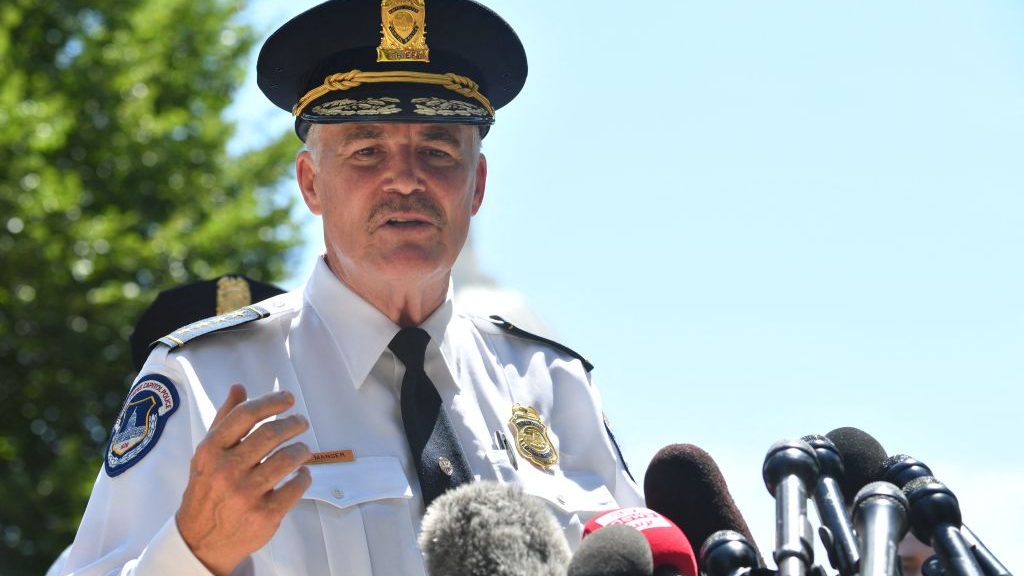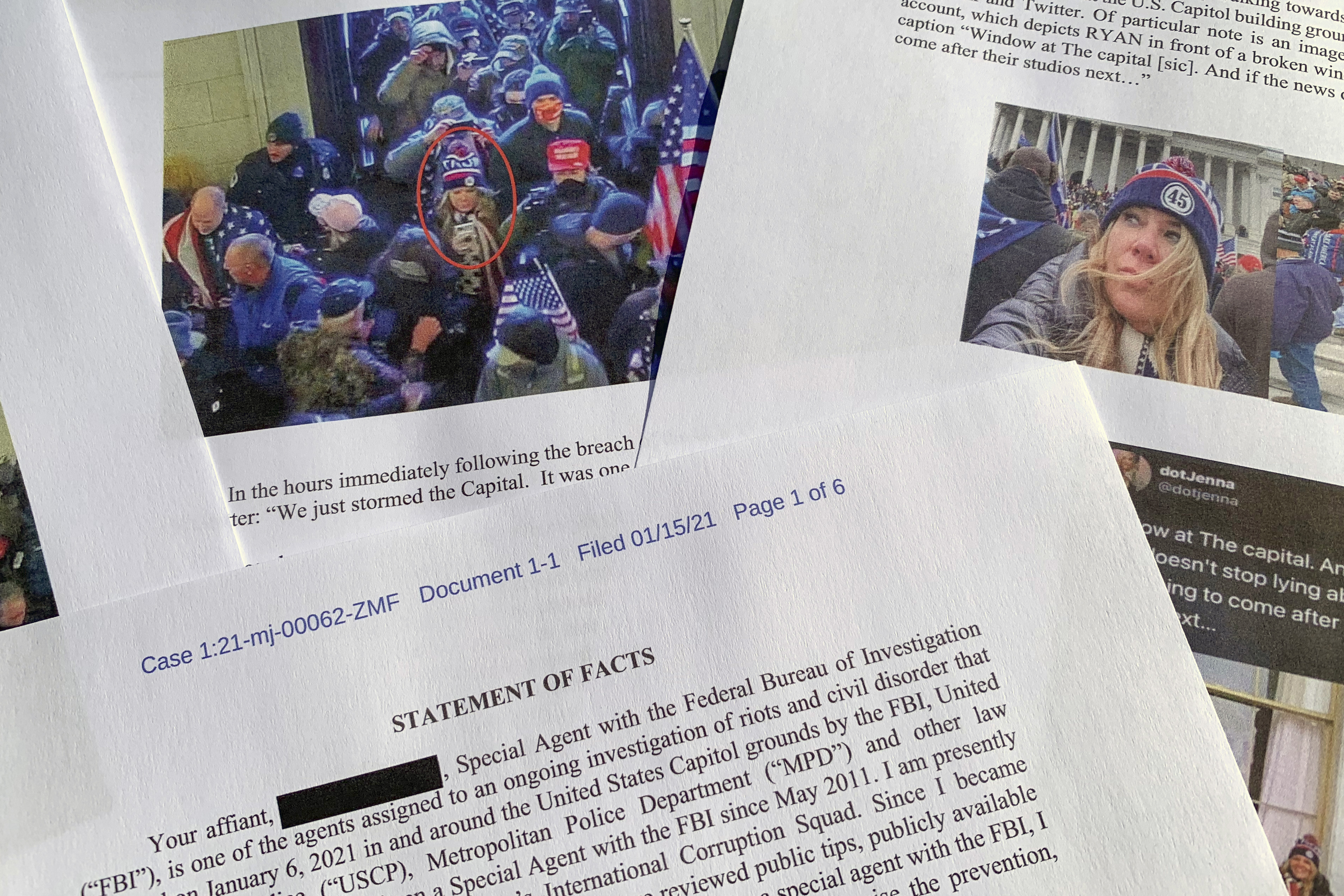A year after rioters took over the U.S. Capitol, spurred on by former President Donald Trump’s false claim that the 2020 presidential election was stolen from him, lawmakers and others continue to worry about the strength of American democracy.
The bloody attack on Jan. 6, 2021, which President Joe Biden’s described as an “unprecedented assault,” came after outgoing President Trump gave a speech repeating his false assertions about a rigged election and landslide victory, and insisting his supporters would “stop the steal.”
He urged those listening to him to “fight like hell” and to march over to the Capitol building to “peacefully and patriotically make your voices heard.”
A crowd did march to the Capitol and a mob broke in, leading to several deaths that day and in the days that followed. Capitol Police officer Brian Sicknick suffered two strokes after being sprayed with a chemical irritant. Four officers later died by suicide. Trump supporter Ashli Babbitt was shot to death by a Capitol Police officer as she tried to climb into the Speaker’s Lobby. Two others had heart attacks, while one died from an accidental overdose of a prescription drug that can be used to treat attention-deficit disorder and narcolepsy.
More than 725 arrests have been made in connection with the riot, and 71 people have been convicted, with 31 of those sentenced to jail time so far. The cases continue.
A House committee continues to investigate and is in a U.S. Supreme Court battle with the former president over documents over which he is trying to assert executive privilege. It is seeking testimony from several Trump associates.
Meanwhile, former top aide Steve Bannon has been indicted on charges of contempt of Congress.
Here is a look at what has happened in the last year:
The U.S. Capitol Is Breached
Jan. 6, 2021
A joint session of Congress meets to certify Joe Biden’s presidential election victory, while outside, after a speech by President Donald Trump, his supporters march to the U.S. Capitol. A mob battles with Capitol Police, breaks into the building, chanting "Hang Mike Pence," and threatening House Speaker Nancy Pelosi and other legislators. Pence and lawmakers are rushed to safety. Later that night, after the building is secured, Biden's win is certified.
Trump Impeached, Again
Jan. 13
President Donald Trump is impeached by the House of Representatives on a single article related to the Jan. 6 assault on the Capitol: "inciting violence against the Government of the United States." A month later he is acquitted in the Senate by a 57-43 vote, short of the 67 votes that would have barred him from running for office again. Democrats had tried to make the case that he intentionally incited the mob to attack the Capitol.
Bravery Rewarded
Feb. 12
Capitol Police officer Eugene Goodman receives the Congressional Gold Medal, the highest civilian honor, for diverting the mob inside the Capitol from the Senate chamber and leading Utah Sen. Mitt Romney away from approaching rioters.
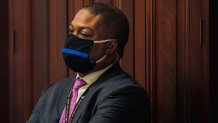
First Rioter Pleads Guilty
April 16
The first guilty plea comes in connection with the riot. Jon Schaffer, a member of the Oath Keepers militia from Indiana, pleads guilty to illegally entering the U.S. Capitol. Schaffer, who turned himself in after a photo was published of him inside the Capitol, was wearing a tactical vest and carrying bear spray.
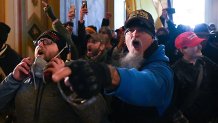
House Launches Investigation
June 30
The House creates a select committee to investigate the attack on the Capitol. Two GOP representatives, Liz Cheney of Wyoming and Adam Kinzinger of Illinois, agree to sit on the committee, angering fellow Republicans. It expects to release an interim report in the summer of 2022.
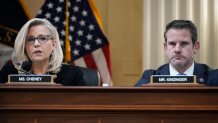
Capitol Officers Testify
July 27
The House Select Committee investigating the deadly Jan. 6 attack holds its first public hearing, with four law enforcement officers testifying about their struggles to defend the U.S. Capitol from a mob of Trump supporters who stormed the building armed with not just makeshift weapons, stun guns and fists, but with racist slurs and accusations of treason.
Since then, the panel has interviewed hundreds of witnesses and collected tens of thousands of documents, and they are planning televised hearings and a series of reports in the coming months that will bring their findings out into the open.
Bannon Indicted
Nov. 12
Former presidential advisor Steve Bannon is indicted on two counts of contempt of Congress after refusing to answer questions or provide documents to the Jan. 6 committee. Trump has told his former aides not to turn over documents that he claims could be protected under executive privilege. The committee noted that Bannon did not work at the White House at the time of the attack, making his communications with Trump not privileged. Bannon left his job at the White House in 2017. The indictment is a first of its kind.

Damning Texts Released
Dec. 13
The House committee investigating the Jan. 6 riot uncovers text messages from the president's son and several Fox News hosts imploring Mark Meadows, then chief of staff, to convince Trump to halt the violence. Two of the hosts, Sean Hannity and Laura Ingraham, complained about their private texts being publicized. On Jan. 4, the committee formally requested an interview with Hannity in a letter that revealed additional texts it had in its possession from before and after the Capitol riot. One specific text from Hannity to Meadows, sent in December 2020, reads: “We can’t lose the entire WH counsels office. I do NOT see January 6 happening the way he is being told. After the 6 th. (sic) He should announce will lead the nationwide effort to reform voting integrity. Go to Fl and watch Joe mess up daily. Stay engaged. When he speaks people will listen.”


Meadows Found in Contempt
Dec. 14
The Jan. 6 committee refers former Chief of Staff Mark Meadows to the Justice Department for a possible criminal charge for refusing to answer questions about the attack. Meadows, a former U.S. representative from North Carolina, provided documents to the congressional committee before claiming executive privilege and halting his cooperation. He allegedly sent an email saying National Guard troops would protect Trump's supporters on Jan. 6. Republican Jim Jordan of Ohio accuses Democrats of destroying executive privilege.
Trump Allies in the Spotlight
Dec. 22
The House committee seeks details from Trump ally Republican Rep. Jim Jordan of Ohio about his communications with the president on Jan. 6. Committee chair Bennie Thompson, D-Miss., says in a letter to Jordan that the committee believes he "had at least one and possibly multiple communications with President Trump on January 6th." Jordan says on Fox News: "We’re going to review the letter." The committee also requests information from Republican Rep. Scott Perry of Pennsylvania, who the panel says communicated with Trump and other GOP members ahead of the attack and strategized about how they could block the results at the Jan. 6 electoral count.
Battle Over Documents
Dec. 23
Former President Trump asks the U.S. Supreme Court to block the National Archives from turning over White House records to the Jan. 6 committee. The committee is seeking documents related to the riot, including records of communications between the White House and the Justice Department. The request comes two weeks after two lower courts rejected Trump's argument that the records are protected by executive privilege. The committee says the high court should let the appeals court ruling stand. President Biden has directed the National Archives to release the documents, however, his White House agreed to shield some Trump-era records sought by the committee if it could compromise national security.
Capitol Breach Cases: Arrests Detailed
Dec. 31
The Justice Department releases a tally of more than 725 arrests in connection with the riot. More than 160 people have pleaded guilty to federal charges, 70 have had their cases adjudicated and 31 were sentenced to time in jail. Robert Palmer of Florida received the most serious punishment, more than five years in prison for assaulting police officers with a fire extinguisher and other weapons. More than 225 are charged with assault or resisting arrest, more than 75 with using a deadly or dangerous weapon against police officers.
'Firsthand Testimony' of Trump's Inaction
Jan. 2, 2022
Rep. Liz Cheney of Wyoming says the Jan.6 committee has testimony that Ivanka Trump asked her father at least twice to intervene to stop the riot. The panel also has "firsthand testimony" that Trump was watching the attack unfold on television while sitting in the dining room next to the Oval Office, Cheney says on ABC News' "This Week."

